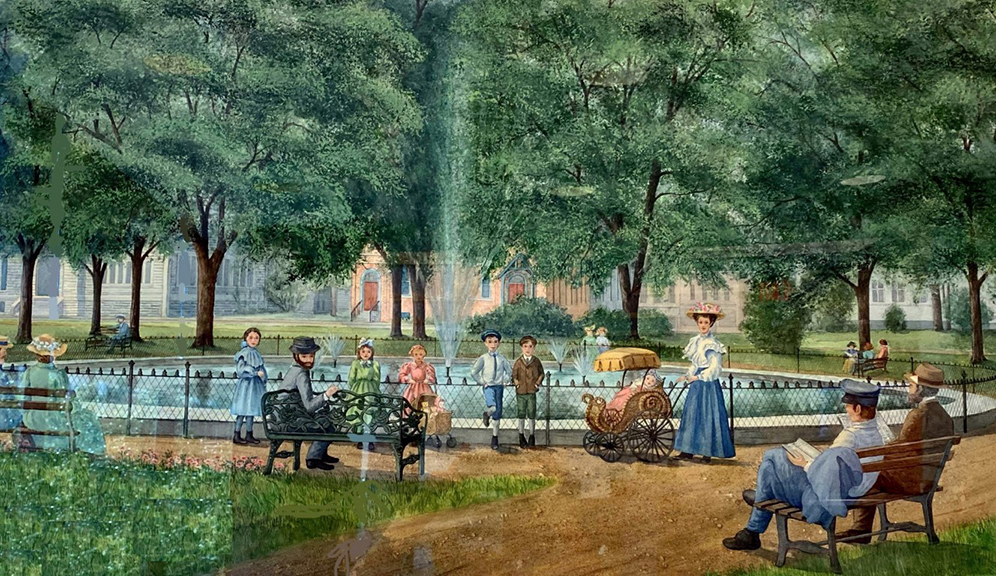Pam Marlin 2021
 Painting of Bronson Park located in the Kalamazoo Public
Library. P Marlin 2021
Painting of Bronson Park located in the Kalamazoo Public
Library. P Marlin 2021
Genealogy research traditionally reveals an ancestor's name, birthdate, occupation, or location. Occasionally, however, it can also reveal an interesting event in an ancestor's life. This was the case when I read the obituary of my distant cousin, Frank Hawley. The event only warranted one sentence in Frank's obituary, but it captured the imagination and wonder of a different time, place, and circumstance.
On August 27, 1856, a political rally was held at Bronson Park, a 3.6 acre green space in the heart of Kalamazoo, Michigan. Thousands assembled at the park as bands, banners, and food welcomed the speakers of the newly formed Republican party. My cousin, Frank Hawley, only four years old at the time, attended the rally with his parents, Calvin Bateman Hawley and Sarah Hawley. A family of farmers, the Hawley's were probably enthralled by all the activity as they rode into town. Little did they know, however, that one speaker at the rally, an unknown man from Illinois named Abraham Lincoln, would play a significant role in America's political future.
Established in 1831, Bronson Park has been part of numerous events for nearly two hundred years. In 2021, I spent some time in the park, focusing on the events that occurred on that day in 1856. I thought about my ancestors and how they perceived what was happening around them. How did they feel about the speeches being made? Did they vote for Abraham Lincoln for president in 1861 because of his speech that day? I will never know, however, I'd like to think that their participation in the rally meant they were interested in the course of historic events and the political decisions that would impact the future I live in now.
An excerpt below from the book, Voyages into Michigan's Past, "They Booed Lincoln in Kalamazoo" provides a glimpse into the crowd's reception of Abraham Lincoln's speech that day.
 Frank Marion Hawley Obituary.
Frank Marion Hawley Obituary.
 Bronson Park looking west, c.1880s.
Kalamazoo Public Library photo
Bronson Park looking west, c.1880s.
Kalamazoo Public Library photo
 Bronson Park today. P Marlin 2021
Bronson Park today. P Marlin 2021
The following excerpt from Voyages into Michigan's Past, by Larry B. Massie, provides a glimpse into the crowd's reception of Abraham Lincoln's speech.
The tall man mounted the speakers' platform that stood atop the ancient Indian mound in downtown Kalamazoo's Bronson Park. A worn coat and vest hung loosely on his gaunt frame, and his trousers barely reached his ankles. His huge gnarled hands grasped the podium as he began to address the crowd in a surprisingly shrill voice. As Abraham Lincoln spoke, his sad homely face shone with passion and his grey eyes flashed. "The question is simply this: Shall slavery be spread into new territories, or not? This is the naked question."
In early August 1856, Republican newspapers across the state issued a call for a "Great Mass convention of the Republican Young Men of Michigan" to be held in Kalamazoo. On August 27, 1856, Republicans poured into Kalamazoo by train, wagon, horseback and on foot. Hezekiah G. Wells, Kalamazoo attorney and chairman of the executive committee in charge of the meeting, had made sure the village was in readiness. A huge banner bearing the names of the Republican state and national nominees stretched across Michigan Avenue. Citizens decorated hotels, stores, and private homes with gaily colored flags and bunting.
Thirty one guns saluted at dawn that day as contingents began arriving at the Michigan Central Depot. Detroit, Ann Arbor, Jackson, Battle Creek, Grand Rapid, and Marshall sent bands. The Delegates paraded from the depot to Bronson Park. Ladies from nearby Richland formed a procession with 31 women dressed in white to represent the sister states, and a lone woman symbolic of Kansas followed behind, shrouded in black. Throughout the village, "all Republican doors were open" to the visitors.
To feed the throng, the committee erected a 100-foot-long table in the park. At noon, two tons of bread, 400 hams and corresponding quantities of beef, potatoes and coffee disappeared into hungry mouths. Four platforms to accommodate the dozens of speakers had been erected in Bronson Park. Michigan sent her best orators. Lincoln, the only speaker from out of state, was an Illinois congressman, little know beyond his district. Wells had met him at a convention in Philadelphia and invited him to Kalamazoo.
Lincoln was scheduled to speak at 2 pm. He took the Michigan Central from Chicago, arrived in Kalamazoo at 1:32 and shouldered his way through the confusion to the rostrum. Lincoln's speech gave little hint of the eloquence he would display in the Gettysburg Address. He urged moderation and conciliation. But when Lincoln pleaded for compromise on the Kansas question, his audience howled and booed.


 Pontiac Gazette (1851), 30 August 1856
Pontiac Gazette (1851), 30 August 1856
Abraham Lincoln in Bronson Park with full speech Kalamazoo Public Library
Lincoln Letter & Speech Kalamazoo Valley Museum